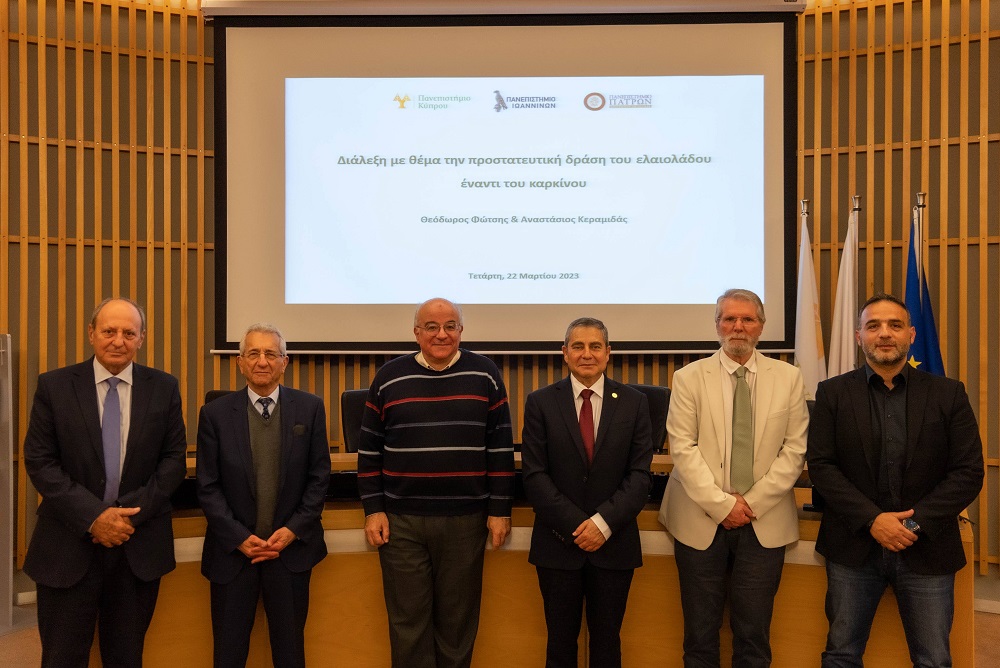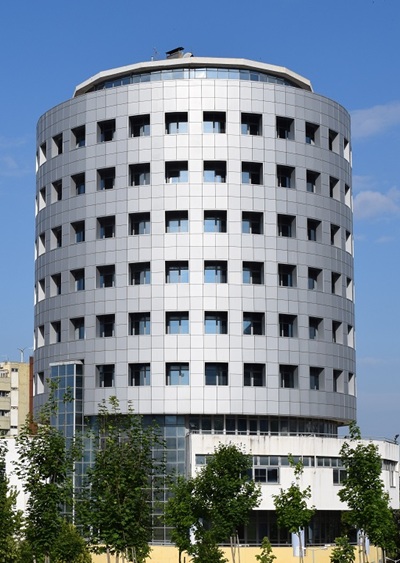
A lecture on the anti-cancer action of extra virgin olive oil was held at the University of Cyprus on Wednesday, March 22, 2023.
The speakers of the lecture were Dr. Theodoros Fotsis, Professor Emeritus of Biological Chemistry at the Department of Medicine of the University of Ioannina and distinguished member of the foundation for research and technology (Institute of Biomedical Research, Ioannina), and Dr. Anastasios Keramidas, professor of inorganic and bioorganic chemistry at the Department of Chemistry of the University of Cyprus, while the event was coordinated by Dr. Nikolaos Dietis, Assistant Professor of Pharmacology at the Medical School of the University of Cyprus.
In his address, the rector of the University of Cyprus, Professor Tasos Christofides, focused on the love of the people of Cyprus for the olive and olive oil. He stressed that the uses and value of olive oil in medicine and pharmacology concern scientists specializing in this field: “This is an interdisciplinary effort of various scientific fields, such as chemistry, medicine, and biology, aiming at the exploitation of its properties for the synthesis of drugs with anti-cancer action and with the ultimate goal of treatment”.
The lecture was also welcomed by the president of the Leventis Foundation, and honorary doctor of the School of Positive and Applied Sciences of the University of Cyprus, Anastasios P. Leventis, who praised the properties of olive oil: “it is a starting point for good health and longevity and a key pillar of the Mediterranean diet”. He also referred to the value of university synergies, such as those between the Universities of Cyprus, Ioannina, and Patras, for research and public enlightenment.
In his intervention, Dr. Fotsis clarified that at the moment extra virgin olive oil is being used for the prevention of cancer and not for the treatment of cancer: “We have not yet reached this level, but this is the ultimate goal”. He referred to the value of the Mediterranean diet combined with physical exercise and the development of strong family bonds as expressions of a particular lifestyle. During the presentation of his research on the effect of 12 samples (10 from Greece and 2 from Cyprus) of extra virgin olive oil (EVOO) on the proliferation of colon cancer cells DLD-1 and HCT-116. Dr. Fotsis explained that while simple olive oil and corn oil, which do not have significant concentrations of polyphenols, have no effect on cancer cell proliferation, all EVOO inhibits cancer cell proliferation to a greater or lesser extent, but this has no correlation with their concentrations of tyrosol and hydroxytyrosol derivatives. The results, Dr. Fotsis concluded, suggest the presence of as yet unknown active compounds in EVOOs that are absent from plain olive oil, most likely of a polyphenolic nature.
Finally, in his presentation, Dr. Keramidas explained the composition of olive oil as well as the research efforts that are being made based on the biochemical action of phenols in extra virgin olive oil for the manufacture of their derivatives aiming to increase their activity in diseases such as cancer: “An example is tocopherols, which are powerful lipophilic antioxidants that protect the body from the toxic activity of active forms of oxygen that can bring about carcinogenesis. “The results are encouraging and likely to lead in the future to the development of new drugs that will replace those currently used in cancer treatment and have high toxicity, such as cis-platin,”
Written by: Marina Frageskidou







Leave A Comment